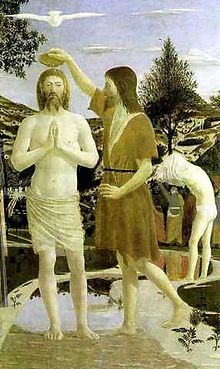- Matthew 3:15
-
Matthew 3:15 is the fifteenth verse of the third chapter of the Gospel of Matthew in the New Testament. Jesus has come to John the Baptist to be baptized, but John balked saying that he should be the one baptized. In this verse Jesus explains why it is he that should be baptized.
In the King James Version of the Bible the text reads:
- And Jesus answering said unto him,
- Suffer it to be so now: for thus
- it becometh us to fulfil all
- righteousness. Then he suffered him
The World English Bible translates the passage as:
- But Jesus, answering, said to him,
- "Allow it now, for this is the
- fitting way for us to fulfill all
- righteousness." Then he allowed him.
For a collection of other versions see BibRef Matthew 3:15
These are the first words spoken by Jesus in the Gospel of Matthew. Since traditionally the Gospel of Matthew is placed as the first book of the New Testament, these are the first words spoken by Jesus in the entire Bible. However they are not very well known or much quoted. Scholars have paid considerable attention to them, mainly because of their vagueness.
Like the previous verse this one only occurs in Matthew. Many scholars see this section as an add-on attempting to explain why the messiah is baptized by someone much lower than he is.[1] The phrase "fulfill all righteousness" is a problematic one. Righteousness is an important concept in Matthew and it generally means obedience to God. Matthew also often uses the word fulfill, with it almost always referring to an Old Testament prophecy that Jesus is fulfilling. Hill notes that the phrase could thus be interpreted as Jesus fulfilling divine rules of which only he is aware.[2] Cullman emphasizes the word all and argues that Jesus' baptism is to obtain righteousness for all humanity. Harrington links the fulfillment not to the Old Testament but to the discussion of fruits of repentance at Matthew 3:8.[3]
A second important issue is why Jesus, who is sinless, should go through a ritual that is designed to cleanse all sins. There are two main explanations of this. One is that Jesus by being baptized is setting a good example for the rest of humanity, that while he does not himself need the cleansing he is showing how important it is for others. The second view is that Jesus' being baptized is part of the process of taking on the burden of the sins of all humanity.[4]
References
- ^ Albright, W.F. and C.S. Mann. "Matthew." The Anchor Bible Series. New York: Doubleday & Company, 1971.
- ^ Hill, David. The Gospel of Matthew. Grand Rapids: Eerdmans, 1981
- ^ Harrington, Daniel J. The Gospel of Matthew. Liturgical Press, 1991 pg. 62
- ^ Clarke, Howard W. The Gospel of Matthew and its Readers: A Historical Introduction to the First Gospel. Bloomington: Indiana University Press, 2003.
Gospel of Matthew Preceded by:
Matthew 3:14Chapter 3 Followed by:
Matthew 3:16
Wikimedia Foundation. 2010.

